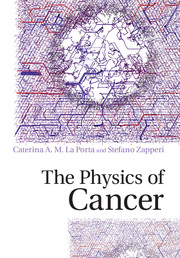Book contents
- Frontmatter
- Dedication
- Contents
- Preface
- 1 Introduction to the Cell
- 2 The Biology of Cancer
- 3 A Modeling Toolbox for Cancer Growth
- 4 Vascular Hydrodynamics and Tumor Angiogenesis
- 5 Cancer Stem Cells and the Population Dynamics of Tumors
- 6 Biomechanics of Cancer
- 7 Cancer Cell Migration
- 8 Chromosome and Chromatin Dynamics in Cancer
- 9 Control of Tumor Growth by the Immune System
- 10 Pharmacological Approaches: Old and New
- 11 Outlook on the Physics of Cancer: A New Interdisciplinary Area
- References
- Index
9 - Control of Tumor Growth by the Immune System
Published online by Cambridge University Press: 04 May 2017
- Frontmatter
- Dedication
- Contents
- Preface
- 1 Introduction to the Cell
- 2 The Biology of Cancer
- 3 A Modeling Toolbox for Cancer Growth
- 4 Vascular Hydrodynamics and Tumor Angiogenesis
- 5 Cancer Stem Cells and the Population Dynamics of Tumors
- 6 Biomechanics of Cancer
- 7 Cancer Cell Migration
- 8 Chromosome and Chromatin Dynamics in Cancer
- 9 Control of Tumor Growth by the Immune System
- 10 Pharmacological Approaches: Old and New
- 11 Outlook on the Physics of Cancer: A New Interdisciplinary Area
- References
- Index
Summary
The immune system is the primary defense of the organism against diseases, but cancer is often able to evade its response. Many advanced therapeutic strategies nowadays aim to redirect the immune response against the tumor. In Section 9.1, we introduce the immune system, discussing innate and adaptive immunity. The ability of cancer cells to escape the immune response is discussed in Section 9.2. The communication between cells during the immune response is coordinated by cytokines, as we discuss in 9.3. The organism responds to external pathogens by a process of inflammation that we review in Section 9.4, where we also discuss its relevance for tumors. Finally, in Section 9.5, we illustrate simple mathematical models for the interactions between cancer cells and the immune system.
The Immune System
The immune system plays the crucial role of defending organisms against not only pathogens but also tumor cells. In mammals, immuno-surveillance is a combination of innate and adaptive immunity (Figure 9.1). The main feature of innate immunity is to activate an immediate response making use of pre-existing mechanisms: mechanical barriers, enzymes, complementary systems and cells, such as neutrophils that can phagocyte pathogens, or like the natural killer (NK) that can kill them. Adaptive immunity is provided by lymphocytes B and T that require first to be activated by pathogens and only then proliferate, finally inducing terminal factors needed to eliminate the pathogens. The whole process of adaptive immunity requires more time than innate immunity, but once the system is immunized, the response is much faster and stronger thanks to the release of memory cells (Figure 9.2). In the adaptive immunity, the antigen should be presented by Major Histocompatibility Complex (MHC) expressed or on the plasma membrane of all the nucleated cells (MHC type I) or on the surface of the antigen presenting cells (MHCII) at the lymphocyte T that recognize the complex MHC-peptide through the T Cell Receptor (TCR). In contrast, B cells recognize directly the antigen through the antibody expressed on the plasma membrane (B Cell Receptor, BCR).
- Type
- Chapter
- Information
- The Physics of Cancer , pp. 123 - 131Publisher: Cambridge University PressPrint publication year: 2017



